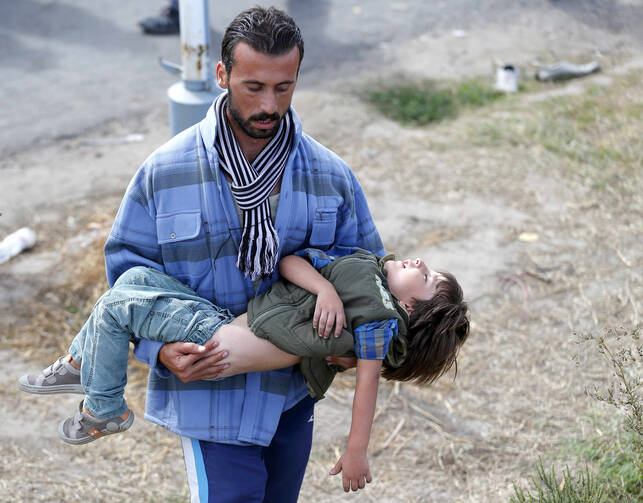As new dimensions and the widening scale of the European refugee catastrophe emerge, a deeper significance has begun to surface, beyond the scope of our imagination until very recently. The more we are learning about this movement of people across at least one continent, the more we understand its deeper realities. And these realities are polarizing commentary and opinion here in Britain.
We might not have realized this until the BBC made an editorial decision to film a religious program in the Calais migrant camp. There several thousand people, travelers from countries like Syria, Libya and Eritrea, have gathered in a camp known as the “Calais Jungle,” hoping to make it to Britain. This program caused great controversy in some sections of British media and society even as it served to reveal the deep faith of many of the migrants. It reminded viewers that the people knocking on the United Kingdom’s doors are real human beings, with faith, hope and fears—far from evil would-be invaders threatening our country and our culture. It is no longer so easy to deny that some of these itinerants are fleeing religious persecution in their countries of origin. To the horror of certain observers, the Calais migrants emerge as real people, some of whom even go to church.
What caught many people by surprise is news footage showing that some of the migrants in the Calais camp had constructed a chapel. Ethiopian and Eritrean worshipers built St. Michael’s Church out of whatever materials came to hand. Nearby, there was an equally makeshift mosque, built also by refugees themselves. The U.K. national broadcaster, the BBC, had been filming in St. Michael’s for a recently broadcast episode of its “Songs of Praise” program, said to be the longest-running religious television program in the world.
The camp’s church is the third such improvised Christian structure. The first lasted until the camp was moved; the second was burned down after a candle was accidentally dropped. The realization that some of these people, like some of us in the United Kingdom, are Christians who take their faith seriously has defied their demonization in some sections of our media and our government.
One U.K. daily, in a spittle-specked fury of indignation, demanded to know why taxpayers’ money was being wasted in this way (the BBC carries no advertising domestically but gets its money from a government-imposed tax commonly known as the TV license). Another, the Murdoch-owned Sun, raging about “Hymnigrants,” likened the BBC’s decision to “something from Monty Python.” Responding, the BBC’s head of religion and ethics, Aaqil Ahmed, wrote in a blog post, “The knowledge that the migrants had built a makeshift church is exactly the kind of action that Christian communities everywhere will relate to.” He denied making any political statement or judgment on migration.
David Cameron, the U.K. prime minister, has refused to compromise on his much-criticized “swarms” description of the refugees. His cabinet colleague, Foreign Secretary Philip Hammond, led a line-up of Tory members of Parliament in condemning the program. He chose even stronger language than Cameron. In his view, “millions of marauding African migrants pose a threat to the European Union’s standard of living and social structure” while maintaining the Tory government’s line that these are economic migrants, not refugees escaping persecution. Government statements, so far, have refused to acknowledge that several other E.U. states have accepted many more refugees than Britain—and made them welcome.
Europe’s troubles deepen each day. The migrant emergency on its southern shores gets worse with no solution in sight as fresh news of human suffering horrifies the continent. The latest developments include yet more capsizings of over-filled vessels and emerging news of chaotic scenes on three Greek islands that were wholly incapable of receiving refugees yet faced record numbers of arrivals. It is only now emerging that large numbers of people are arriving not only in Greece but also in Bulgaria and Hungary, countries whose resources are already thin.
What we are seeing is a humanitarian disaster on a much larger scale than previously thought, of which the Calais standoff is numerically only one small part. In the pictures and stories from the Calais church, we saw and heard real people and were reminded of the real human tragedy extending from our continent’s southern to northern shores. Real people, fleeing from real persecution, real danger. This is our 21st-century Exodus.








